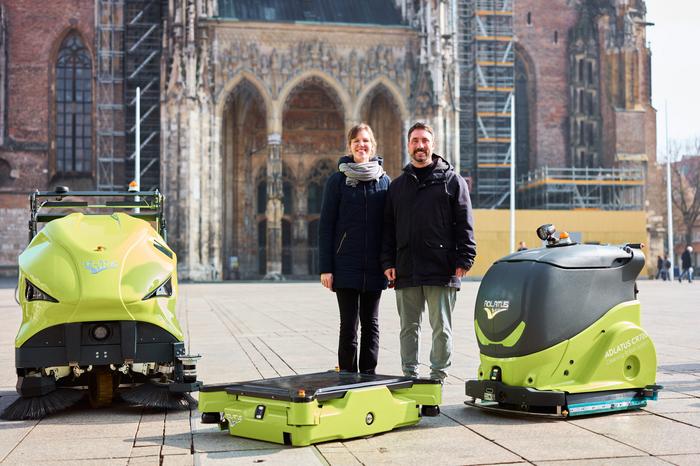You wonder how psychologists are involved in the development and design of innovative technologies, such as robots? Well, in fact, they play an important role in this connection as, nowadays, it is no longer sufficient that technologies simply do what they are supposed to do. The use and operation of modern tools and technologies are required to be as natural and intuitive as possible. “When humans and their needs are taken account of in creating new technologies, i.e., when these are developed both for and by people, we speak of a human-centered approach to technology design,” explained Professor Johannes Kraus of Johannes Gutenberg University Mainz (JGU). “In the best of circumstances, we look at what people need from a technical system such as a smartphone, a machine at work, or even a robot, what tasks they would like to undertake with these, and what requirements, expectations, and anxieties come into play when using these systems.” It is in this context that psychology becomes relevant, especially in terms of human-technology interaction. This special field is also called Engineering Psychology or Human Factors Engineering.

Credit: photo/©: Thomas Abé
You wonder how psychologists are involved in the development and design of innovative technologies, such as robots? Well, in fact, they play an important role in this connection as, nowadays, it is no longer sufficient that technologies simply do what they are supposed to do. The use and operation of modern tools and technologies are required to be as natural and intuitive as possible. “When humans and their needs are taken account of in creating new technologies, i.e., when these are developed both for and by people, we speak of a human-centered approach to technology design,” explained Professor Johannes Kraus of Johannes Gutenberg University Mainz (JGU). “In the best of circumstances, we look at what people need from a technical system such as a smartphone, a machine at work, or even a robot, what tasks they would like to undertake with these, and what requirements, expectations, and anxieties come into play when using these systems.” It is in this context that psychology becomes relevant, especially in terms of human-technology interaction. This special field is also called Engineering Psychology or Human Factors Engineering.
New junior professorship in the Department of General Experimental Psychology
Following the appointment of Johannes Kraus to a junior professorship in Applied Cognitive Psychology with a focus on Human Factors at the JGU Department of General Experimental Psychology in October 2023, a considerable proportion of the ZEN-MRI project has been transferred to Mainz University. ZEN-MRI is the abbreviation for the full German project name, which translates into English as the Ulm Center for Research and Evaluation of Human-Robot Interaction in Public Spaces. “My former working environment was back at Ulm University and the trial site for the project will remain in Ulm,” said Professor Johannes Kraus. “Here at JGU, I will be continuing my research, focusing on the psychological processes that occur during interactions with intelligent technologies, such as AI software, autonomous vehicles, and robots. I will significantly extend the scope of this work together with my team here at Mainz University.”
Dr. Marlene Wessels, who has recently been awarded her doctorate by the JGU Department of General Experimental Psychology, has been part of the ZEN-MRI project since it was launched at Mainz University in March 2024. Her expertise in the field of experimental investigation of interaction strategies with the help of virtual reality (VR) is a very valuable addition to the research program. “We are putting together a lab in which we can study individuals’ reactions to various robots in different situations in virtual environments. We will be looking at how rapidly and how closely robots can approach humans without the latter feeling uncomfortable and what sort of sound levels robots need to produce to ensure that they are perceived both as unthreatening and even sympathetic, for example,” added Wessels.
Collaborative project funded by the German Ministry of Education and Research
The ZEN-MRI project is funded by the German Federal Ministry of Education and Research (BMBF) to the end of August 2025. It is a collaboration of Mainz and Ulm University, the Institute for Digital Ethics of Stuttgart Media University, the City of Ulm, Adlatus Robotics GmbH, which manufactures the robots under investigation, and the Fraunhofer Institute for Industrial Engineering IAO in Stuttgart. The aim is to determine how congenial co-existence between human beings and robots can be achieved in public areas. Being investigated are aspects such as what robots should look like and how they should behave. Also being considered is the information that needs to be provided to citizens to ensure they have a realistic mindset when they encounter a robot. The various facets will additionally be assessed in the context of extreme situations to make sure that robots can go about their business with minimal interference and, all being well, are even accepted as likeable companions. Another major objective of the project is to determine how robots can be used to enhance the accessibility and inclusive design of human-robot interactions. With this in view, a study is currently being undertaken involving visually impaired subjects to examine their specific requirements in connection with robots in public spaces.
Promotion of the interaction of humans and intelligent technology
During the coming weeks, the lab in Mainz will be equipped with a state-of-the-art VR setup and supplied with several physical robots that will be employed as interaction partners during research. The team headed by Professor Johannes Kraus will be extended by two doctoral candidates. “I am very much looking forward to fostering the exploration of human-intelligent technology interactions with the help of my team here in Mainz,” emphasized Kraus.



